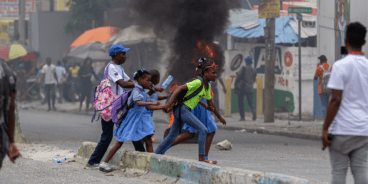
Remarks delivered at UN General Assembly Ministerial Side Event on “Ensuring Justice for Syria”
Remarks delivered by Dr. Simon Adams, Executive Director of the Global Centre for the Responsibility to Protect, on 27 September 2018 at UN Headquarters in New York.
I would like to thank the co-hosts of this important event, the Minister of Foreign Affairs of Liechtenstein and the Minister of Foreign Affairs of the State of Qatar.
Twenty-three years ago the Bosnian Serb General and war criminal Ratko Mladić was the swaggering commander of troops that massacred 8,000 men and boys at Srebrenica, brazenly carrying out a genocide in the heart of Europe. At the time Mladić was considered all-powerful in the territory his forces controlled. The prospect of his facing accountability for these atrocities seemed virtually impossible.
Last year, on 22 November, Ratko Mladić was found guilty of genocide, war crimes and crimes against humanity in the final verdict of the International Criminal Tribunal for the former Yugoslavia, proving that even the most powerful and malevolent perpetrator can no longer rely upon the permanence of impunity.
As we witnessed in Yugoslavia, the war in Syria has been characterized by an utter lack of accountability for perpetrators of war crimes and crimes against humanity. For seven and a half years various parties to the conflict have conducted indiscriminate attacks on civilians, perpetrated sexual violence, deliberately blocked humanitarian aid, bombed hospitals, targeted humanitarian workers, and used food as a weapon to starve besieged communities.
We have even witnessed the gradual normalization of the use of illegal, immoral and indiscriminate chemical weapons, despite the fact that the prohibition of such weapons is one of the oldest norms of the international community, dating back to 1899.
Earlier this year over 1,700 civilians across eastern Ghouta were killed in the space of a few weeks due to shelling and airstrikes. Although a similar offensive on Idlib province appears – at least temporarily – to have been put on hold, millions of civilians in Syria still face the threat of mass atrocity crimes. Consequences for these atrocities have been minimal, largely due to systematic diplomatic obstruction by a permanent member of the UN Security Council.
However, as the verdict in Mladic’s case has proved, international justice can catch up with all perpetrators of genocide, war crimes and crimes against humanity, regardless of how powerful they currently seem.
The establishment of the International, Impartial and Independent Mechanism for Syria nearly two years ago represented the unwillingness of the wider international community to accept the failure and inaction of the UN Security Council, and directly challenges the prevailing climate of impunity. As we have heard today, the Mechanism’s efforts to document evidence of the crimes committed in Syria and to prepare cases against perpetrators will prove essential when the time arrives for prosecution and justice.
Although the creation of a tribunal, or a referral to the International Criminal Court, may seem politically out of reach at present, member states can and should seek justice through other avenues, including the use of universal jurisdiction. Several countries, including Sweden, Germany, and France, are already investigating individuals who are alleged to have committed grave crimes in Syria. The IIIM can contribute to these and other efforts, and the cooperation of governments, the UN system, and civil society, including through access to documentation and material, remains crucial.
We must recognize that the IIIM cannot end the suffering of Syrian civilians. However, the IIIM’s work can ensure that at very least, the perpetrators of mass atrocity crimes in Syria will one day face justice. As such, the IIIM symbolizes a first step away from impunity and towards accountability.
As a representative of civil society I therefore want to end this statement by saying to all our Syrian friends – including representatives of torture victims and the “White Helmets” who are here in the room with us today – that we will not cease our efforts until we see all those responsible for war crimes and crimes against humanity in Syria face their victims in a court of justice.
Thank you.
Related Publications


11th Meeting of the Global Network of R2P Focal Points Outcome Document
